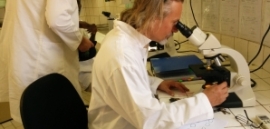Disease Ecology, Health and the Environment
Scientists are discovering new links between human health and the health of the natural environment. At Stanford, researchers are studying these connections and pioneering ecological solutions to disease.
It expands on an initial keystone project called the
Upstream Alliance, a multi-institution initiative seeking environmental interventions to curb the spread of
schistosomiasis, a waterborne parasitic disease affecting about 250 million people. Results from a demonstration project in Senegal show that the team’s reintroduction of native prawns at river access points led to fewer disease-carrying snails and reduced transmission of schistosome parasites to people.
The Program for Disease Ecology, Health and the Environment is a joint initiative with the Stanford Woods Institute for the Environment and the
Center for Innovation in Global Health at Stanford University’s School of Medicine. Its mission: To discover ecological solutions to humanity’s health challenges and to develop the next generation of planetary health innovators.
The program is led by
Giulio De Leo, a biology professor at Stanford’s Hopkins Marine Station and a senior fellow at the Stanford Woods Institute, and
Susanne Sokolow, a research associate at Hopkins Marine Station.

